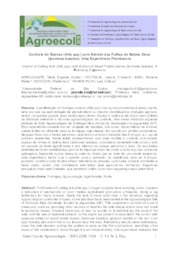Controle de saúvas (Atta spp.) com extrato das folhas de batata-doce (Ipomoea batatas): uma experiência promissora.
Controle de saúvas (Atta spp.) com extrato das folhas de batata-doce (Ipomoea batatas): uma experiência promissora.
Summary: Resumo: A proliferação de formigas saúvas (Atta spp.) nos agroecossistemas é preocupante, uma vez que causam redução da produtividade ou mesmo inviabilizam a produção agrícola, sendo um grande gargalo para muitos agricultores. Devido à carência de dados mais sólidos na literatura referente a técnicas agroecológicas de controle, vêm sendo testadas algumas práticas no Sítio Agroecológico da Embrapa Meio Ambiente, localizada em Jaguariúna (SP). Esta experiência consiste em um conjunto de medidas, tais como: disponibilizar no entorno outras fontes de alimento para as formigas, cujo ataque não resulte em perdas econômicas; bloqueio físico dos olheiros próximos, para inibir e atrasar o trabalho das formigas; e o uso de extratos repelentes. Neste relato apresentamos com mais detalhe o controle com extrato aquoso de folhas de batata doce (Ipomoea batatas), pulverizado semanalmente sobre o solo em parcela de horta agroflorestal e nos olheiros de saúvas próximos à área. Os resultados preliminares foram satisfatórios, pois as formigas pararam de visitar a horta logo nas primeiras aplicações, buscando outras áreas do entorno. Ainda que se trate de um estudo incipiente, esta experiência indica que o extrato possui potencial de repelência para as formigas, podendo constituir uma técnica eficaz minimizar os ataques, com baixo impacto ambiental e baixo custo, sendo uma promissora alternativa para agricultores familiares. Sugere-se pesquisas mais aprofundadas, que permitam validar com mais segurança essa alternativa. Abstract: Proliferation of cutting ant (Atta spp.) in agro ecosystems is worrying, since it causes a reduction of productivity or even makes agricultural production unfeasible, being a big bottleneck for many farmers. Due to the lack of more solid data in the literature regarding agroecological control techniques, some practices have been tested in the Agroecological Site of Embrapa Meio Ambiente, located in Jaguariúna (SP). This experiment consists of a set of measures, such as: providing other sources of food for the ants whose attack does not result in economic losses; physical blockage of nearby scouts, to inhabitant lay the work of the ants; and the use of repellent extracts. In this report we present in more detail the control with aqueous extract of sweet potato leaves (Ipomoea batatas), sprayed weekly on the soil in an agro forestry plot and in the scrub leaves near the area. Preliminary results were satisfactory, since the ants stopped visiting the garden as early as the first applications, searching other areas of the environment. Even though it is an incipient study, this experiment indicates that the extract has the potential of repellent for the ants, being an effective technique to minimize the attack, with lower environmental impact and low cost, being a promising alternative for family farmers. It is suggested that further research be carried out to validate this alternative with greater certainty.
Publication year: 2018
Types of publication: Paper in annals and proceedings
Unit: Embrapa Environment
Observation
Some of Embrapa's publications are published as ePub files. To read them, use or download one of the following free software options to your computer or mobile device. Android: Google Play Books; IOS: iBooks; Windows and Linux: Calibre.
Access other publications
Access the Agricultural Research Database (BDPA) to consult Embrapa's full library collection and records.
Visit Embrapa Bookstore to purchase books and other publications sold by Embrapa.

